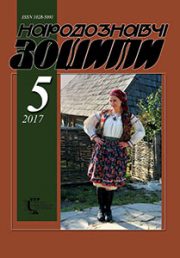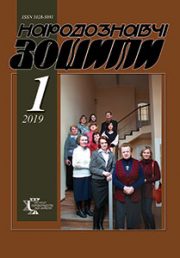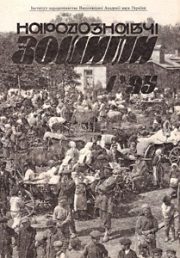The Ethnology Notebooks. 2022. № 2 (164), 441—459
UDK [94(477.83/.86): 061.22ПРОСВІТА]”18″
DOI https://doi.org/10.15407/nz2022.02.441
MARKIYAN SHASHKEVYCH — THE BIRTH OF A NATIONAL CULT (1862—1879)
PASHUK Volodymyr
- ORCID ID: https://orcid.org/0000-0002-3536-1848
- Candidate of Historical Sciences, Senior Researcher,Ukraine Department of the I Krypyakevych Institute NAS of Ukraine,
- Senior Researcher of New History,
- 4, Kozelnytska Street, 79000, Lviv, Ukraine,
- Contacts: e-mail: volparo@gmail.com
Abstract. The importance of the topic is relevant due to the importance of the social studies and lack of research. The main goals are: to find out the processes, actions associated with the emergence of the national cult of M. Shashkevych and to reveal its nature. The relevant actions have been traced as well as its character, trends and the defining components of this phenomenon and importance for social development have been outlined.
The subject of research is: the actions and measures of the Galician gradual movements (for instance, populists and the «Prosvita» Society), aimed at honoring the figure, activities, and the birth of the national cult of Markiyan Shashkevych. The object of research is: nation-building processes and the Ukrainian socio-political movement in Galicia focused on the formation of modern social institutions.
The methodological base consisted of description, analysis, synthesis. The lack of historiography determined the importance of such sources as the popular publications of that time and the Protocols of the «Prosvita» Society.
The process of origin and creation of this important social institution is clarified. It covered the period of 1862—1879 and was divided into two stages: 1862—1867 and 1868—1879, in which the populists took the first steps and actions to commemorate the «Awakener of Galician Rus».
The result of the study. Based on the analysis of the presented data, it was found out that the emergence of the cult of M. Shashkevych as a national phenomenon involved a number of components:
1) The formation of the ideological basis, which included the creation of a cult image, hence the official attention to this figure and its separation from other prominent people, expressing their sympathy, appreciation of his personality and his activity, addressing to the figure as to a indisputable moral authority in defending their views and actions and as a defining example to follow;
2) Organization of public musical and poetic evenings, which meant the spread of this institution in the elite environment and part of the society;
3) Giving the figure of M. Shashkevych a social scale. He was interpreted as a poet-writer, creator of a new folk (national) literature, and most importantly, as a public figure who determined the national direction of Galician progress. This meant a movement for the implementation and realization of his ideas, ideological positions, which was done by the creators of the cult.
Keywords: Markiyan Shashkevych, Galician populists, national cult of Markiyan Shashkevych, formation of the Ukrainian modern nation, «Prosvita» Society, Galicia of the XIX century.
Received 31.01.2022
REFERENCES
- Horyn’, V. (2011). The origins of the cult of Markiyan Shashkevich. Dzvin, 11/12, 127—132 [in Ukrainian].
- Shashkevych, V. (1862). To my Father. Vechernytsi (Part 19) [in Ukrainian].
- Shashkevych, M. (1862). Over the Bug. Vechernytsi (Part 20) [in Ukrainian].
- Klymkovych, K. (1862). [Epilogue]. Vechernytsi (Part 20) [in Ukrainian].
- (1862, September 13). To n. r. h. m. subscribers Vechernitsa (Part 33) [in Ukrainian].
- (1863, April 4). Something about translations of the old Rus’ song «The Tale of Igor’s Campaign» into the folk word. Vechernytsi (Part 13) [in Ukrainian].
- (1865). Galician-Russian Matytsia and its goal. Meta, 4 [in Ukrainian].
- (1865). News. Meta, 18 [in Ukrainian].
- Chornyj, Ya. (1867, 11 July). The meaning of etymology. Pravda (Part 11) [in Ukrainian].
- (1868, March 15). From Vienna. Foundation of the Sich. Funeral for Markiyan Shashkevych. Pravda (Part 10—11) [in Ukrainian].
- (1868, June 8). (From above the Dniester). Something else about «Russian Reader» by A. Toronsky. Pravda (Part 21) [in Ukrainian].
- (1868, June 15). (From above the Dniester) Something else about «Russian Reader» by A. Toronsky. Pravda (Part 22) [in Ukrainian].
- (1869). Our Moscow cripples. Pravda (Part 13) [in Ukrainian].
- Central State Historical Archive of Ukraine, Lviv (CDIAL of Ukraine. F. 348. Op. 1. File 7628 [in Ukrainian].
- (1872). News. Pravda (Ch. 3) [in Ukrainian].
- (1872). An evening in memory of Markiyan Shashkevych. Pravda (Part 4) [in Ukrainian].
- (1872). Markiyan Shashkevych’s life and literary activity (Speech of Prof. Dr. Omelyan Ogonovsky delivered at a poetry evening organized by the «Enlightenment» Society in memory of the poet. the day 7. Gregorian calendar. July s. r.) True. Pravda (Part 4) [in Ukrainian].
- Ogonovsky, O. (1872). A brief look at the history of Slavic languages, especially the history of the Rus’ language. Pravda (Part 5) [in Ukrainian].
- (1872). Siromanets’. Ukrainophilism in connection with the eastern policy of Prussia and the «Russification» of the West. Pravda (Part 7) [in Ukrainian].
- (1873). Can we have an consensus between the Ruthenians and the «Russians»? Pravda (Part 1) [in Ukrainian].
- (1873). News. Stanislavskaya Gymnasium. Pravda (Part 2) [in Ukrainian].
- (1873). News. Pravda (Part 3) [in Ukrainian].
- Drahomanov, M. (1970). Literary and journalistic works: in 2 vol. (Vol. 1). Kyiv [in Ukrainian].
- (1873). Ukrainian Literature, Russian, Velykorussian, Ukrainian and Galician. Pravda (Part 6) [in Ukrainian].
- (1873). News: Academic Circle «in words and deeds». Pravda (Part 8) [in Ukrainian].
- (1873). News. Pravda (Part 10) [in Ukrainian].
- (1873). News. Pravda (Part 9) [in Ukrainian].
- (1874). Sixth General Meeting of Enlightenment. Pravda (Part 7) [in Ukrainian].
- (1873). Markiyan Shashkevych (speech of prof. Verkhratsky on the 30th anniversary of M. Shashkevych’s death). Pravda (Part 11) [in Ukrainian].
- (1873). Markiyan Shashkevych (a thing on Verkhratsky Avenue on the 30th anniversary of M. Shashkevych’s death). Pravda (Part 12) [in Ukrainian].
- (1873). Navrots’kyj. Ukraine il movimento letterario rutene in Russia e Gallizia (1798— 1872). Pravda (Part 15—16) [in Ukrainian].
- (1874). The heading politically social. Review for the year 1873. Pravda (Part 1) [in Ukrainian].
- (1874). Literature Russian, Velykorussian, Ukrainian and Galician. Pravda (Part 6) [in Ukrainian].
- (1875). Malorus’ka nationality. Pravda (Part 15) [in Ukrainian].
- (1876). Literary news. The story of Osip Fedkovych. Pravda (Part 4) [in Ukrainian].
- (1876). Speech of Volodymyr Barvinsky was delivered at a musical-recitation event in Lviv on the 15th anniversary of Taras Shevchenko’s death on March 11, 1876. Supplement to Part 6 of Pravda. Pravda (Part 6) [in Ukrainian].
- (1876). News, notes and correspondence. Pravda (Part 12) [in Ukrainian].
- (1879). Bibliography, Manuscript Koroledvorska. Pravda (Issue 5) [in Ukrainian].
- (1880, 11 (23) June). News. Monument to Markiyan Shashkevych. Dilo (Part 45) [in Ukrainian].
- Pashuk, V. (1996). Society «Enlightenment» — the ideological successor of the «Russian Trinity» Shashkevychiana. New series (Ussue 1—2, pp. 301—306). NAS of Ukraine, Institute of the Ukrainian Studies I. Krypyakevych. Lviv; Brody; Winnipeg [in Ukrainian].







